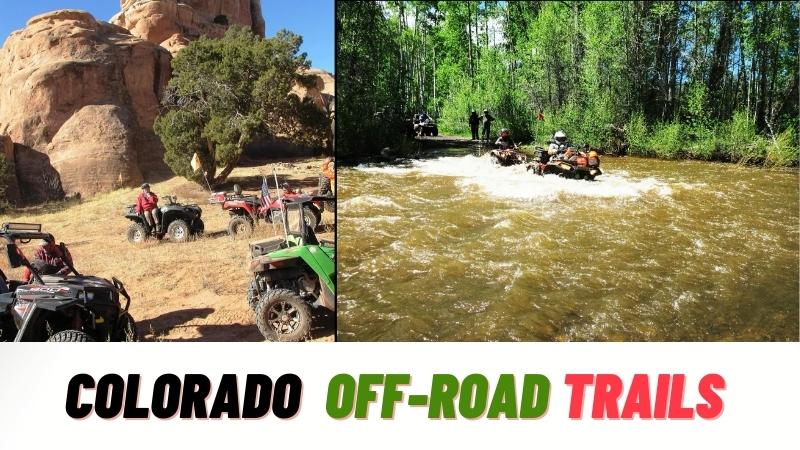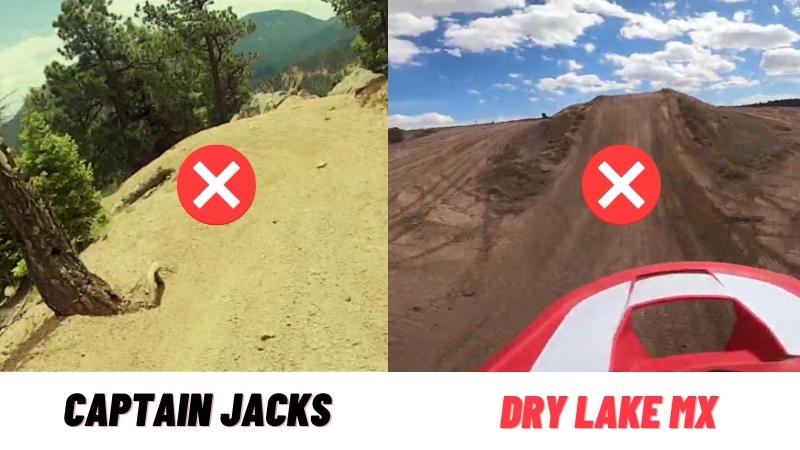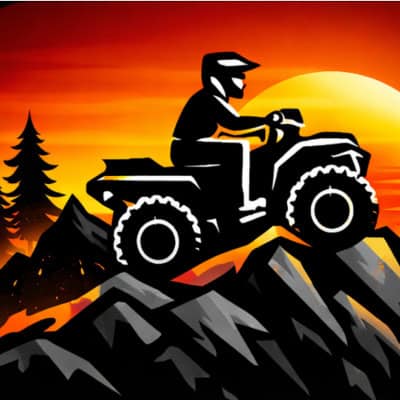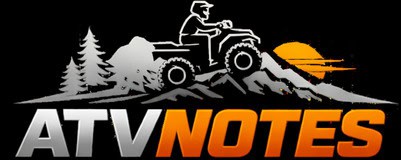Colorado is one of the most popular states for ATV riders. The state is home to diverse terrain, ranging from mountains and deserts to forests and canyons, making it an ideal destination for all off-road enthusiasts. Colorado Trail is over 567 miles of running from Denver to Durango offers you the most attractive scenery in Colorado Rockies.
Many communities in the state have established formal trail systems and even host events like races and festivals that highlight this type of activity. Additionally, many local businesses cater specifically to ATV riders with rentals, tours, and gear shops.
Like the ATV laws in Arizona, Alaska, California, and other states; off-road vehicle riders must follow specific rules and regulations while riding ATVs in Colorado. So, before hitting the best off-road trails in Colorado, it is crucial to know the ATV laws in Colorado that govern the use of these vehicles there. These laws are designed to ensure safety for riders and other outdoor enthusiasts sharing the trails.
The state has established various rules regarding the operation of ATVs, including age requirements, licensing and registration processes, and safety measures such as helmet use. There are specific areas designated for ATV use, while in others, ATVs may only be ridden on private property.
Thus, understanding Colorado ATV laws and regulations will help you decide where and when to ride your ATV. Common sense, knowing the ATV laws of a particular zone will help you avoid hefty fines or legal repercussions if you unintentionally break them.

Jump To Contents
- Am I allowed to ride an ATV in Colorado?
- What do the Colorado ATV laws stipulate about riding ATVs?
- Are there ATVs that hardly need to get registered?
- Am I allowed to ride my ATV on private lands?
- Should I register my model If not running on private lands or properties?
- Are there parks where I can ride my ATV in Colorado?
- What if an ATV accident occurs while riding in Colorado?
- What do Colorado ATV hunting laws state?
- What do Colorado ATV helmet laws adult state?
- Observe Colorado ATV Laws and Ride Worry-free
Am I allowed to ride an ATV in Colorado?
Not really. Unlike some other states of the U.S., ATVs in Colorado are not street-legal. In fact, from 2021, one is not allowed to ride ATVs on the streets of Colorado. However, there is more to the road for you, as the law now permits municipalities and counties to designate certain roads and streets where ATV riders can ride and have fun.
Despite this, you must adhere to the rules set out by these entities. Since these rules vary from one locality to another, you must know them well to avoid getting into the wrong hand of the law. Thankfully, these local rules are available at your nearest brick-and-mortar sheriff’s office.
What do the Colorado ATV laws stipulate about riding ATVs?
Since Colorado boasts of having a myriad of ATV operations going on nearly daily, enforcing laws is crucial to governing how ATVs are ridden here. Like OHV laws in other ATV zones, violating the laws can cause you to get sentenced or fined. Worse still, you risk losing your ATV as it might be seized from you. To be on the safe side, you must acquaint yourself with the following Colorado ATV regulations:
- You are not permitted to ride your ATV on highways, public streets, and other roads. The only exception is when you want to ride your ATV for emergency or agricultural purposes.
- You are required by law to register and number your ATV. Riding an unregistered or unnumbered ATV is a crime in Colorado. To prove that you own the ATV, you must possess a receipt/certificate of title/bill or sale, among other documents. Remember that these documents will be required during the registration process identical to the ATV rules in Alabama, California and other popular ATV zones in the US.
- You are required to be 16 years and above for you to operate an ATV. Kids aged 10-15 need to be supervised by an adult with a valid driver’s license.
- Before kickstarting your riding sessions on public land trails, you must obtain an off-highway use permit. This permit has to be well displayed on your ATV.
- Your ATV must have vital components such as tail lamps, brakes, mufflers, spark arrestors, and brakes.
- When riding your ATV, you are forbidden from harassing animals on the way. Also, you should not chase them using your ATV.
- Your ATV should only produce noise whose decibel is 96 and below whenever used.
- When it comes to ATV helmet laws in Colorado, those riders below 18 years need to wear a helmet whenever they are riding their quad.

Are there ATVs that hardly need to get registered?
Previously, we have mentioned that all ATVs must be registered before being used in Colorado. However, we have exceptional cases. For instance, those ATVs the government possesses need not be registered for them to operate. In addition, the quads used in agricultural activities are not required by law to be registered. The following are more categories of ATVs exempted from being registered:
- Those models that are ridden on private property
- Those that participate in organized races
- Those ATVs used for educational programs
- Those models are owned by a person not living in Colorado. However, such a model needs to be registered in the foreigner’s home country.
- Those models are used for commercial uses such as firewood cutting, mining, logging, etc.
I have seen, while riding there, Utah ATV laws exempt some ATVs from registering, especially the ones meant for animal husbandry.
Am I allowed to ride my ATV on private lands?
Yes. The good news is that you can now go ahead and ride your ATV on private lands in Colorado. Private lands are owned by individuals, corporations or trusts and provide opportunities for off-roading enthusiasts to explore new trails. Before taking your ATV out on private land, it is important to get written permission from the owner. This will help protect both parties in case of any accident or damage.
In addition, it is important to follow all state laws and regulations regarding off-road vehicles while on private land. These laws include wearing proper safety gear such as helmets and eye protection, having a valid driver’s license or OHV permit, and avoiding areas that are designated as off-limits for ATVs. Additionally, riders should be respectful of the landowner’s property and leave no trace behind.
Should I register my model If not running on private lands or properties?
In Colorado, it is mandatory to register your ATV (All-Terrain Vehicle) with the state Department of Motor Vehicles. Even if you plan on using your ATV solely on private land or property, it still must be registered. The registration process involves completing an application form and paying a fee that varies depending on the type of ATV and its intended use.
While it may seem like a hassle to register your ATV if you only plan on using it on private land or property, there are several reasons why this is necessary. First and foremost, registering your vehicle will ensure that you are in compliance with state laws and regulations. This can help you avoid fines or legal problems down the line.
Another reason to register your ATV is for insurance purposes. If you are involved in an accident while operating your vehicle on private land or property, having it registered can help protect you from liability issues. Additionally, some insurance providers may require proof of registration before providing coverage for your vehicle.
Overall, while it may not be required by law to operate an unregistered ATV on private land or property, doing so could leave you vulnerable to legal and financial risks.
Are there parks where I can ride my ATV in Colorado?
Yes. There are many parks where you can ride your quad and have fun with your loved ones. However, there are some parks you can ride on your ATV paying an entry fee. Others need a specific permit before they can start their riding escapade. The following are some of the popular parks where you can ride your ATV in Colorado:
1. Grand Valley OHV Area
First, this park has an array of terrains where you can ride your ATV and have fun. From rugged terrains to smooth ones, there are plenty of terrains that you can find here. Fortunately, riders are allowed to ride their ATVs here almost throughout the year. Besides ATVs, other OHVs that are permitted here include:
- Jeeps
- Dune buggies
- SXXs
- Dirt bikes
If you are a trailblazing fan, be sure you shall have a field day at this park. In most cases, trails here are characterized by the following features:
- Mud
- Small jumps
- Loose dirt
- Rocks
- Steep hills
- Large jumps
- Hardpack
- Dust
- Trees
As part of the Colorado ATV trails laws, all ATVs must have a spark arrestor exhaust silencer or the end cap.
2. Straight Creek Trail
Unlike other conventional trails in Colorado, this one opens on the 21st May and closes on the 22nd of November annually. If you must ride your ATV here, you must have a Colorado OHV sticker. As far as this trail’s distance is concerned, be sure you will cover 6 miles using your ATV. This trail features the following:
- Trees
- Loose chunk rocks
- Loose dirt
- Dust
- Mud
- Water crossings that are not easy to cross
Different from the parks discussed previously, trailblazing is not allowed here. Apart from the ATVs, some OHVs you can ride here include UTVs, dirt bikes, motorcycles, and SXSs. However, the following OHVs are forbidden from being driven here:
- Jeeps
- 4X4s
- Dune buggies
- Sandrail 4x4s
If your vehicle has to access the trails, its width should be at most 50 inches. In addition, your model should come with a spark arrestor.
3. Alpine Loop

If you are after fun riding an off-road vehicle during summer, this is a perfect destination for you. Note that this park opens in June and closes in October annually. Here, you will come across designated tails characterized by ghost towns, mines, mills, abandoned railroads, etc. To learn more about the history of this area, consider covering the 65 miles of this area’s trail in its entirety.
Unlike other parks, the trail system here has several recreational vehicle campgrounds. Also, you will come across 5 staging sections. Some of the models that are allowed to be ridden here include:
- Motorcycles
- SXSs
- Sand Rail 4x4s
- Jeeps
- Dirt bikes
- UTVs
- Dune buggies
If you have to ride your OHV here, ensure it has a spark arrestor, end cap, or exhaust silencer. Moreover, your model should produce noise at most 96 decibels.
4. Ram Off-Road Park
Also known as El Paso County, this park offers 6 miles of trails. Steep hills, trees, berms, large jumps, sand, loose dirt, dust, rocks, mud, hard pack, among other features, mainly characterize these trails.
You can only ride in this park if you have an ATV or Sandrail 4X4S, Dune buggies, SXSs, Dirt bikes, 4x4s, motorcycles, etc. Riding your ATV at this park will cost you $15, $50 for UTV, and a ride on dirt bikes will cost $10.
Besides riding in this park, you can also camp and light campfires here. Reminder, you are not allowed to ride your ATV at night. Ensure you arrive by 8 AM if you want to access this park. The ride is allowed from 8 AM to 5 PM, Monday to Friday. As an exception on weekends, the park is usually open from 9 AM to 4 PM.
Places prohibited for riding your ATV in Colorado
There may be several reasons why some places in Colorado and other ATV zones are off-limits for ATV riders. Firstly, it’s important to understand that certain areas of the state have been designated as protected wilderness or sensitive ecosystems. These areas may contain endangered species, fragile habitats, or other environmental features that could be damaged by motorized vehicles.

Another reason why some parts of Colorado may be prohibited to ATV riders is due to safety concerns. Some areas may have steep cliffs, loose rocks, or unstable terrain that could pose a risk to both the rider and the environment.
Sometimes there may be legal restrictions on where you can ride your ATV. For example, many national parks and forests have their own rules and regulations regarding motorized recreation. It’s essential for anyone planning an ATV trip in Colorado or elsewhere to research their route beforehand and make sure they’re following all relevant laws and guidelines.
Here you find some of the areas in Colorado where you are not allowed to ride your ATV.
- Captain Jacks Trail
- Dry Lake MX Park
- Aztec Family Raceway
- Thunder Valley Motocross Park
What if an ATV accident occurs while riding in Colorado?
In the case of an accident while riding your ATV and, by any chance, you cause damage to property worth $1550 or even more or cause an injury that makes someone get hospitalized or die, you have to ensure that you alert the Colorado state patrol officer.
Better still, notify the sheriff of the locality where the accident occurred. If you cannot report the incident to any of these two individuals, consider alerting the police officer of the municipality where you had an ATV accident.
What do Colorado ATV hunting laws state?
You are allowed to use your ATV for hunting while in Colorado. However, there are certain rules to abide by:
- You are only permitted to use your ATV to transport the hunters to the downed animal’s location.
- You are not allowed to harass any wildlife that you find along the way.
- As you hunt riding on ATV, you must consider other hunters as you undertake your activities. This is because today’s behavior of hunters influences the future privileges allowed to hunters using ATVs.
- If you must carry any firearm when hunting, it must be fully unloaded. This means that the magazine and chamber should not contain any bullets. Additionally, your bows and firearms must be carried using a soft or hard case.
What do Colorado ATV helmet laws adult state?
If you are an adult, you are not required to wear a helmet when riding an ATV in Colorado. However, some municipalities require you to wear an ATV helmet, particularly when you are riding a quad on public land.
Alongside the helmet, you must wear sunglasses or any other safety gear that will help optimize the security of your head and eyes during your riding escapades. However, if you are at most 18 years, you are required by law to wear a helmet. Such individuals need to wear DOT-approved helmets all the time.
But my advice to adult riders, you must wear an accurate size helmet while riding on ATV. Riding without a helmet may not be illegal for an adult but it is surely an unnecessary risk. To avoid risk and ensure safety, choosing the appropriate ATV helmet is a must wherever you ride both for you and your fellow rider.
Observe Colorado ATV Laws and Ride Worry-free
Since the enactment of law banning the use of ATVs in Colorado in 2021, there has been a lot of confusion on whether one should ride their ATV in this state. The reality is ATVs are allowed on public roads though under exceptional circumstances. However, certain designated public roads and park trails are where you might enjoy riding your ATV. You should be well aware of ATV laws in Colorado to avoid being arrested or fined to observe the laws and regulations. Thus, you will ride your ATV worry-free in Colorado.

ATVNotes is an off-road resource focused on ATV and UTV winching, recovery systems, safety gear, tires, batteries, and essential off-road equipment. Content is produced by the ATVNotes Expert Team and written from the perspective of a practical off-road recovery advisor, emphasizing real-world performance, system compatibility, and safety-first practices across trail riding, utility use, and off-road exploration.
